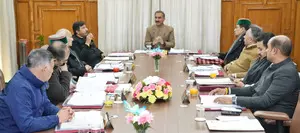Himachal cabinet decisions: STF to fight drug abuse, 12 pc stamp duty, increase in BPL list

Shimla, Jan 9 The Himachal Pradesh cabinet, chaired by Chief Minister Sukhvinder Sukhu, on Thursday, took several important decisions, including the setting up of a Special Task Force (STF) to dismantle drug trafficking, levying 12 per cent stamp duty on transfer and lease transactions and increase in the BPL Beneficiary list. The cabinet also paid tributes to former Prime Minister Dr Manmohan Singh and observed two minutes of silence in his memory.
The state cabinet approved the inclusion of families in the BPL list, with no adult members between the ages of 18 and 59, headed by women, whose head has a disability of 50 per cent or more, families that worked for at least 100 days under MGNREGA in the previous financial year, and those whose earning members are suffering from chronic diseases such as cancer, Alzheimer’s, Parkinson’s, muscular dystrophy, thalassemia, or any other condition resulting in permanent disability.
It also approved the establishment of a Special Task Force (STF) to combat drug abuse and dismantle drug trafficking and organised crime networks in the state through a comprehensive, multi-faceted approach.
Additionally, the cabinet has decided to promulgate an ordinance to amend Schedule 1A of the Indian Stamp Act, 1899. This amendment will enable the levy of a uniform stamp duty rate of 12 per cent on transfer and lease transactions secured under Section 118 (2) (H) of the Himachal Pradesh Tenancy and Land Reforms Act, 1972, with prior sanction from the state government.
The cabinet decided to approve the ban on the felling of trees except for safeda, poplar and bamboo while felling of khair for sale in accordance with the 10-year programme.
The cabinet approved the guidelines for the ‘Sarkar Gaon Ke Dwar’ programme to redress the grievances of the common man residing in remote and hard areas. The cabinet reiterated its request to the Government of India to adopt the 90:10 funding formula for the power component of the Kishau multipurpose project, similar to the formula adopted for the water component. Alternatively, it proposed providing a 50-year interest-free loan for the entire amount payable by the state for the power component under the Inter-State Agreement.
In addition, the state cabinet has decided to delegate the mandate for the allotment and monitoring of hydro and solar power projects above 5 MW, as well as green hydrogen, biomass, and pumped storage projects to the Department of Energy.
It also approved the establishment of a one MW green hydrogen project in the industrial town Nalagarh in Solan district, to be executed by HPPCL.
Furthermore, the cabinet approved the imposition of Green Energy Development Charges for Pumped Storage Projects. A charge of Rs 2.5 lakh per MW per year will be levied for the first 10 years after the project’s commissioning, which will increase to Rs 5 lakh per MW per year thereafter.
The cabinet gave its nod to rename Himachal Pradesh Institute of Public Administration (HIPA) as Dr Manmohan Singh Himachal Pradesh Institute of Public Administration.
The cabinet acknowledged his contributions to the nation and Himachal Pradesh’s development. The cabinet noted that several key projects in the state were realized due to Dr Singh’s vision and support. These include the Atal Tunnel, three medical colleges, the ESIC Hospital at Ner Chowk, IIT Mandi, IIIT Una, the Central University, and the National Institute of Fashion Technology (NIFT) in Kangra. It was also mentioned that Dr Singh’s tenure as Prime Minister and Union Finance Minister was transformative. His initiatives such as the Right to Information Act, Right to Education Act, MGNREGA, the Food Security Act, the introduction of Aadhaar, Direct Benefit Transfer (DBT), and the historic loan waiver for 72 lakh farmers were highlighted as milestones.
The Indo-US Nuclear Deal during his prime ministership was hailed as a strategic achievement with lasting benefits for India. As Union Finance Minister, Dr Singh was instrumental in pulling the country out of an economic crisis and laying the strong foundation for economic reforms that reshaped India’s financial landscape, an official statement said.
Source: IANS